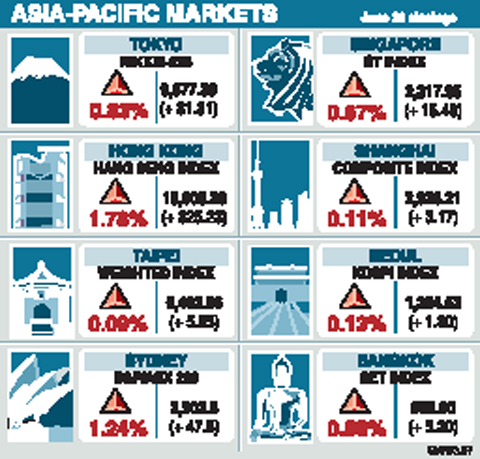Asian stocks rose in the past week, led by consumer, technology and financial companies on optimism the global economy is rebounding.
Samsung Electronics Co, the world’s biggest maker of liquid-crystal-display (LCD) televisions, added 6.1 percent as a government report showed the US economy shrank less than expected. Bridgestone Corp, the world’s largest tiremaker, climbed 7.8 percent in Tokyo, after narrowing its loss forecast. Industrial & Commercial Bank of China Ltd (中國工商銀行) gained 5 percent in Hong Kong amid speculation loan growth will boost earnings.
“Investors still believe the global economy will start to recover later this year and this confidence is leading to resilience in the market,” said Naoki Fujiwara, who oversees the equivalent of US$3.7 billion at Shinkin Asset Management Co in Tokyo.

The MSCI Asia-Pacific Index gained 2.2 percent in the past five days to 103.66, recouping some of the previous week’s 3.5 percent decline. This week’s gain extended the gauge’s rally from a more than five-year low on March 9 to 47 percent. Japan’s Nikkei 225 Stock Average rose 0.9 percent, while Hong Kong’s Hang Seng Index added 3.8 percent.
MSCI’s Asian index plunged by a record 43 percent last year as the credit crunch tipped the world’s largest economies into recession. The rally since March has been fueled by optimism that government stimulus measures and interest-rate cuts worldwide will succeed in reviving global growth.
Taiwanese share prices are expected to extend gains next week as institutional investors tend to boost share prices to dress up their books with the second quarter coming to an end, dealers said on Friday.
Blue chips that have close business ties with China are likely to benefit most as the government is scheduled to release regulatory details next week to govern Chinese investments in Taiwan, they said.
However, the electronic sector may lag as investors will possibly keep adjusting high-tech portfolios after the recent upturn, they added.
Likely institutional buying is expected to push the index towards 6,700 in the first half of the week, but profit-taking may emerge with technical support expected at around 6,300, dealers said.
For the week to Friday, the weighted index rose 232.41 points, or 3.73 percent, to 6,463.56 after a 3.37 percent fall a week earlier.
Average daily turnover stood at NT$108.56 billion (US$3.29 billion), compared with NT$99.87 billion a week ago.
Other regional markets:
KUALA LUMPUR: Up 0.15 percent. The Kuala Lumpur Composite Index gained 1.66 points to 1,075.77.
JAKARTA: Down 0.19 percent. The Jakarta Composite Index lost 3.97 points to 2,040.19.
MANILA: Up 0.40 percent. The composite index rose 9.88 points to 2,477.44.
MUMBAI: Up 2.92 percent. The 30-share SENSEX rose 419.02 points to 14,764.64.

MORE VISITORS: The Tourism Administration said that it is seeing positive prospects in its efforts to expand the tourism market in North America and Europe Taiwan has been ranked as the cheapest place in the world to travel to this year, based on a list recommended by NerdWallet. The San Francisco-based personal finance company said that Taiwan topped the list of 16 nations it chose for budget travelers because US tourists do not need visas and travelers can easily have a good meal for less than US$10. A bus ride in Taipei costs just under US$0.50, while subway rides start at US$0.60, the firm said, adding that public transportation in Taiwan is easy to navigate. The firm also called Taiwan a “food lover’s paradise,” citing inexpensive breakfast stalls

TRADE: A mandatory declaration of origin for manufactured goods bound for the US is to take effect on May 7 to block China from exploiting Taiwan’s trade channels All products manufactured in Taiwan and exported to the US must include a signed declaration of origin starting on May 7, the Bureau of Foreign Trade announced yesterday. US President Donald Trump on April 2 imposed a 32 percent tariff on imports from Taiwan, but one week later announced a 90-day pause on its implementation. However, a universal 10 percent tariff was immediately applied to most imports from around the world. On April 12, the Trump administration further exempted computers, smartphones and semiconductors from the new tariffs. In response, President William Lai’s (賴清德) administration has introduced a series of countermeasures to support affected

CROSS-STRAIT: The vast majority of Taiwanese support maintaining the ‘status quo,’ while concern is rising about Beijing’s influence operations More than eight out of 10 Taiwanese reject Beijing’s “one country, two systems” framework for cross-strait relations, according to a survey released by the Mainland Affairs Council (MAC) on Thursday. The MAC’s latest quarterly survey found that 84.4 percent of respondents opposed Beijing’s “one country, two systems” formula for handling cross-strait relations — a figure consistent with past polling. Over the past three years, opposition to the framework has remained high, ranging from a low of 83.6 percent in April 2023 to a peak of 89.6 percent in April last year. In the most recent poll, 82.5 percent also rejected China’s

PLUGGING HOLES: The amendments would bring the legislation in line with systems found in other countries such as Japan and the US, Legislator Chen Kuan-ting said Democratic Progressive Party (DPP) Legislator Chen Kuan-ting (陳冠廷) has proposed amending national security legislation amid a spate of espionage cases. Potential gaps in security vetting procedures for personnel with access to sensitive information prompted him to propose the amendments, which would introduce changes to Article 14 of the Classified National Security Information Protection Act (國家機密保護法), Chen said yesterday. The proposal, which aims to enhance interagency vetting procedures and reduce the risk of classified information leaks, would establish a comprehensive security clearance system in Taiwan, he said. The amendment would require character and loyalty checks for civil servants and intelligence personnel prior to